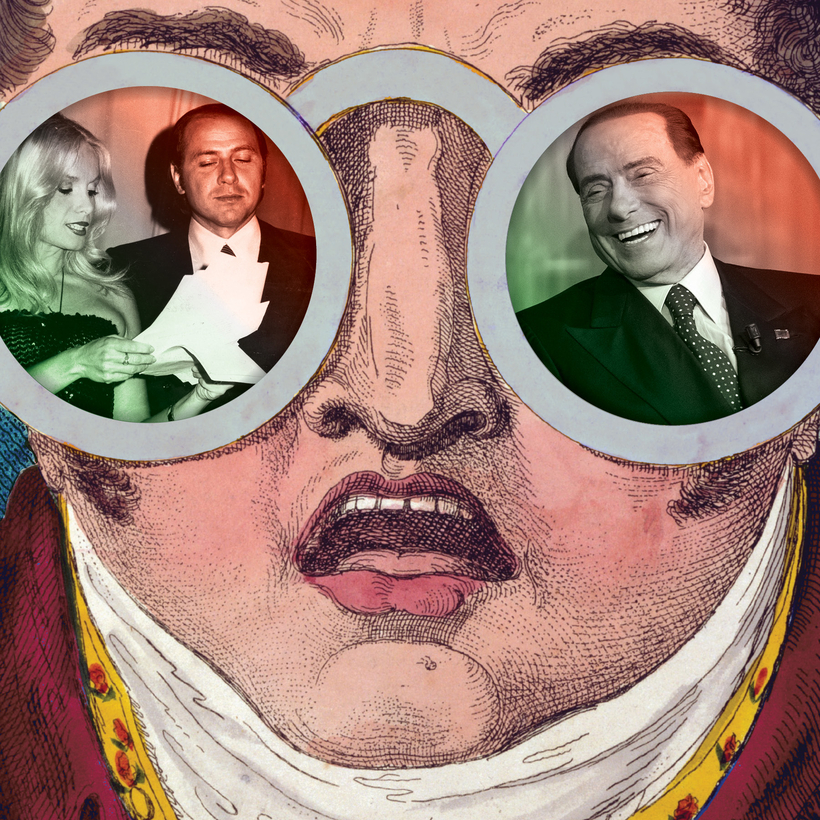Silvio Berlusconi was Trump with a human face.
And that means that the two men had a lot less in common than most Americans think. The former Italian prime minister, for all his bluster, spray tans, and showmanship, was loyal to Europe and the Atlantic alliance and even the Italian constitution—well, at least the parts of it that didn’t clash with his criminal-defense strategies. Berlusconi was often provocative, but he was far more disciplined and worldly than Trump and not at all as destructive, vengeful, and hate-filled. Truthfully, at times he was a lot of fun.
For one thing, he could be funny at his own expense. “America? I love America,” he beamed during the first interview I ever had with him, held in a gold-and-cream reception room in his 17th-century Baroque palace in Rome. “I am on whatever side America is on, even before I know what it is.”
Several of Berlusconi’s exes and his last girlfriend, Marta Fascina, 33, who is 53 years younger and very blonde, attended his state funeral in Milan’s Duomo cathedral on Wednesday along with thousands of Italians who crammed into the piazza to mourn. There was less love shown by his peers abroad: the highest-level American attendee was the Rome Embassy’s chargé d’affaires, possibly because when Vladimir Putin invaded Ukraine, Berlusconi was one of the few former European leaders who defended him. The statesmen who did attend his funeral were hardly democracy’s finest: Prime Minister Victor Orbán of Hungary and Qatar’s emir, Sheikh Tamim bin Hamad al-Thani.
Berlusconi didn’t command a lot of respect even when he was in power. He came to politics as an entertainer (in his youth, he worked as a crooner on ocean cruises) and as a self-made billionaire and media mogul. He definitely shared Trump’s sexist bravado. He was an unabashed throwback to the 50s, and he reveled in bunga bunga and young girls galore. And plenty of Italians—including some women—admired his Hugh Hefner swagger and irreverence. Unlike Trump, Berlusconi loved to laugh, sometimes even at other people’s jokes. (It’s impossible to find a picture of Trump laughing—he has no sense of humor.)
After Berlusconi’s wife Veronica published a letter in La Repubblica demanding that her husband apologize for his philandering, Berlusconi was asked to respond. “She should publicly apologize to me,” he said grandly, “and even then I don’t know if that would be enough.” They split up in 2009, and by 2017 he had persuaded a judge to let him claw back about $70 million in alimony.
Berlusconi, for all his bluster, spray tans, and showmanship, was loyal to Europe and the Atlantic alliance and even the Italian constitution—well, at least the parts of it that didn’t clash with his criminal-defense strategies.
He definitely had Trump’s vanity and reliance on face-lifts, thinning-hair contortions, and terra cotta–colored makeup. When I wrote about him for The New York Times Magazine, I noticed how he would pause before sitting down at a conference table, so his aides could slip a cushion onto his seat to ensure that his height (five-foot-five) aligned with that of the others. When world leaders stood for a group photo, Berlusconi rose on tiptoe just before the camera lights flashed.
He was a center-right populist, but an optimistic one. However despised he was by the Italian intelligentsia, Berlusconi offered his followers hope, not hate. His rallies were operatic sales pitches, and his promises, empty though they may have been, were aspirational—less red tape, more opportunities for self-advancement, and a shot at wealth. His policies were borrowed from Margaret Thatcher and Ronald Reagan, but he presented them with the infectious geniality of a game-show host. He liked to call himself L’Entusiasmatore.

Berlusconi didn’t pander to voters’ worst fears and deepest resentments. At least, not seriously. He was for immigration before he was against it. But even when the refugee crisis in Europe grew too terrible to ignore, he fulminated against illegal immigrants with a wink. In 2010, he announced an accord with Albania to crack down on smugglers ferrying immigrants onto Italy’s Adriatic shore. He couldn’t resist adding that he would make exceptions, “for anyone bringing over beautiful girls.”
And under his watch, Italy took in about the same number of immigrants as it did before his tenure and after. So whatever his election-time rhetoric, Berlusconi didn’t do much to stem the tide.
Many Italians blamed him for mishandling the economy, but the country’s G.D.P. relative to Western Europe’s remained consistent before he took office and after. He didn’t fix Italy’s debt issues, but nobody else has, either.
The secret of Italian politics is that its leaders, however determined, can’t do much to change the status quo—mandates, edicts, reforms, budgets, legislation, all have a way of sinking under the weight of global economic trends, not to mention Italian tradition, inertia, and a national talent for lawlessness. That’s why Giorgia Meloni, the first neo-Fascist prime minister since the war, has given lip service to right-wing causes, including issuing fines to reduce the number of Anglicized words in official documents (reti sociali, not social media: big whoop). Yet her actions basically adhere to the centrist, pro-Western policies of her predecessors, including Berlusconi.
When world leaders stood for a group photo, Berlusconi rose on tiptoe just before the camera lights flashed.
If anything, Berlusconi’s most pernicious legacy is bad taste. In a country that has high aesthetic standards for even the most ordinary things—a tiled floor, a coffee spoon, a policeman’s uniform—he aimed for the lowest and flashiest common denominator. The vulgarity of Italian television was ahead of its time. In 1987, while Americans were watching The Cosby Show, Italians feasted on Colpo Grosso, a quiz show where contestants and scantily clad models would striptease—a kind of Jeopardy Satyricon.
“He understands the weaknesses of Italians because he shares them,” Indro Montanelli told me in 2000. Montanelli, who died in 2001, was once Italy’s most respected conservative columnist and the editor of Il Giornale, Berlusconi’s newspaper. He left in 1994, unwilling to lend unflagging support to the owner’s political ambitions. “I had a lot of fun with Berlusconi,” Montanelli recalled, almost wistfully. “You cannot imagine his ability to lie. Not necessarily to cheat you, just for the sheer gusto of it. He persuades himself at the same time he persuades you. But he is a brilliant salesman—he can persuade Italians that he will deliver on promises that are unkeepable.”
Berlusconi wasn’t above the law, he was ahead of it, nimbly using his political power to change a statute of limitation here, introduce amnesties there, and get adverse rulings overturned all over Italy. At the time of his death, he had been convicted only once—for tax fraud and embezzlement within his media company, Mediaset, which owned his private television networks, among other things. He was sentenced to four years in prison, but a pardon covered three of them, and for the fourth he was ordered to do community service in deference to his age. He took a limousine to visit patients in a Catholic hospice near Milan once a week.
When he left office in 2011, he was trailed by scandals, court cases, and a charge that he paid an under-age girl for sex (for which he was acquitted). He kept trying to get back into power, but his hold on the center right had slipped. He fell out with Meloni, once his protégée, and at the end of his life he found himself on the wrong side of European foreign policy.
Berlusconi fell out with many foreign leaders when he stayed loyal to his friend in the Kremlin, defending Russia’s war in Ukraine. Unlike Trump, however, he finally surrendered to popular sentiment and issued a statement saying that the invasion was “indefensible.”
He was as devious and flexible at the end as he was at the beginning of his career. Berlusconi wasn’t Trump. At worst, you could label him Trump, Italian-style.
Alessandra Stanley is a Co-Editor at AIR MAIL


